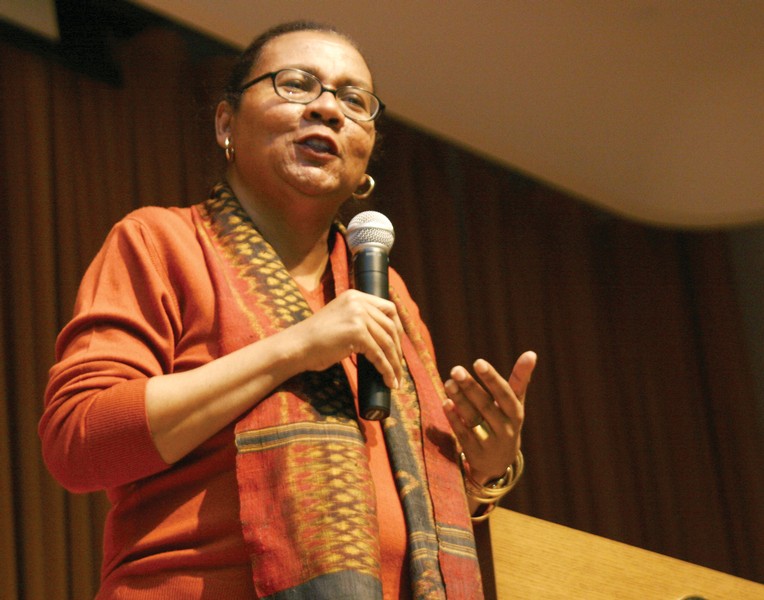Serendip is an independent site partnering with faculty at multiple colleges and universities around the world. Happy exploring!
Notes Towards Day 9 (Tues, Sept. 27): Opening Doors, Opening Minds


bell hooks........................................................................................................................kai davis
I. coursekeeping
naming some more...
for Thursday, read a January 2000 New York Times Magazine
article by James Traub, “What No School Can Do" (accessible directly
from the Times site, through an Augsburg College syllabus, or --
w/ poor margins!--from our password-protected file)
We'll spend the first part of class discussing that essay;
Jomaira and Sarah will run the second 1/2 of class,
preparing us for our visit to Parkway West right
after fall break, on Oct. 18th
Friday evening, your 5th paper is due: 3 pp. re-thinking your thinking
about the possibility that education can (or can not) "level the playing field."
(For some of you this might mean rethinking your last paper;
for others it will involve more brand- new work; all of you should
incorporate the work of Noguera, Traub, and/or your classmates'
postings/our class discussion, as a way of extending/testing
what you already know experientially....)
shared conversation about the writing/revising process-->
how are we doing w/ this, generally?? insights? challenges??
on the paradox-and-challenge of speaking from your
own experience, in order to have it revised; a very
subtle dance of authority-and-humility....
consider beginning your next paper w/
one of the strong quotes from Noguera's essay,
and writing in response to what he says:
"Access to public education in the United States is complete, universal,
and compulsory ... the only public service that functions as a form of social
entitlement: a "positive right" and social good provided to citizens and noncitizens alike" (p. 7)
"simply providing access to education is [not!] equivalent to providing equal opportunity ...
We continue to delude ourselves with the notion that the United States is a democracy
based on genuine meritocratic principles; a society where social mobility is determined
by individual talent and effort" (p. 15).
"Horace Mann's belief that schools should function as the great 'equalizer' of opportunity:
an arena where inherited privileges do not determine one's opportunities" (p. 22).
II. We ended class on Thursday
by listening to some of Kai Davis's spoken word poetry -->
highlighting the issue of what language(s) we use "in class,"
asking how bell hooks' ideas about decorum/censoring might be helpful ....
a number of your postings kept on mulling over these questions:
S. Yeager: [3 songs] about being alienated by the school system, instead of being helped by it…. the education system ... excludes all but those who fit it neatly … our education system as it now stands doesn't exemplify the ideals of democracy at all, but, rather, something akin to an aristocracy, wherin those who have access to resources keep access by virtue of having been born with it and those who do not are continuously barred
Serena: education… does not benefit as many people as we would like to think. This is … the fault of … a complex relationship of inequalities and hereditary attitudes.
Mfon: education cannot erase the effects of a disadvantaged background
jrschwartz15: education does not equalize our society. If anything, education is what divides out society.
thamid: money seems to level the playing field of education
III. Does bell hooks offer us any way to think about/adress these issues?
Take a minute to write on cards the quotes you pulled out on Tuesday--
pass them to me to read out, so we can all respond....
p. 3: "School was the place of ecstasy--pleasure and danger.
To be changed by ideas was pure pleasure. But to learn ideas
that ran counter to values and beliefs learned at home
was to place oneself at risk..."
* joy of students not accepting our guidance
abuse of freedom in class, to dwell on personal experience
university as haven for those unfit for social interaction
teach w/out reinforcing existing systems of domination
* feminist critique: powerful gift flawed
water that contains some dirt (to extract, and be nourished);
cf. luxurious 1st world waste of the impure
* shallow emphasis on coming-to-voice:
wrong belief in democratization of voice: equal time, equal value of all


Horace Mann........................................................................Pedro Noguera
IV. Let's do the same thing w/ Pedro Noguera's 2003 essay,
“Finding Hope Among the Hopeless”:
write out a quote that (for whatever reason)
you found striking, and pass it to me....
[Barometer:] Please stand in a single line.
I will read a sentences you've selected from Noguera's essay.
If you agree w/ the statement, please move towards the door;
if you disagree, please move towards the windows.
Please explain yourself, first to those closest to you, then to us all.
If hearing these explanations affects your position,
please re-locate your body accordingly.
p. 3: urban school failure is pervasive
p. 4: however, urban public schools are indispensable to those they serve
p. 5: play a vital role in supporting low-income families
p. 6: neighborhood constants...because they have a relatively stable
source of funding ensured by the legal mandate to educate children
p. 7: Access to public education in the United States is complete, universal,
and compulsory ... the only public service that functions as a form of social
entitlement: a "positive right" and social good provided to citizens and noncitizens alike.
p. 8: Ensuring that the needs of students and their parents are treated
as the highest priority, may be the most radical reform of all.
p. 9: education .... alone has the ability to transform and improve
the lives of even the neediest and most downtrodden individuals
p. 10: all children ... can learn and grow in positive and productive ways when provided the opportunity.
I have seen education open doors for those who lacked opportunity, and
open the minds of those who could not imagine alternative ways of being and living.
Like Freire, I have seen education enable students to "perceive critically the way they exist in the world...."
p. 11: not learning simply is not an option
p. 12: there is more to achieving academic and personal success than effort alone ....
the vast majority of those who are born poor, stay poor.
p. 13: while effort is a key ingredient for individual success ... it is not a guarantee ...
academic failure for large numbers of poor and workiing-class children is inevitable
the failure of low-performing schools does not pose a problem for the economy
failing schools are treated as local matters... responsibility...delegated to...the communities they serve
p. 14: it is possible to create schools that serve poor children well
p. 15: the dearth of good schools is the inevitable by-product of a system that is almost completely unaccountable to those it serves... the quality of service provided has no bearing whatever on the ability of the system to function .... simply providing access to education is [not!] equivalent to providing equal opportunity ...We continue to delude ourselves with the notion that the United States is a democracy based on genuine meritocratic principles; a society where social mobility is determined by individual talent and effort.
we are generally far more comfortable extoling the virtues of individual responsibilty and merit [than considering that] structural change is the solution
p. 16: Freire ... calls on teachers to treat conditions of oppression as "limit situations": problems that require critical reflection, engagement, and praxis ....strategies for countering these conidtions can be devised.
p. 20: the most crticial ingredient of school success--the availability of highly skilled and dedicated professionals ....
most important, the possibility for better education exists because children are fundamentally educable and capable of learning at high levels.
p. 21: schools that scucceed at educating poor children... are guided by a coherent mission ... a sense of accountabiility ... and an esprit de corps ... a sense of purpose and commitment
"At this school, we know we can save all of our children ... we can do a better job because we love the children, and it shows in what they can do."
commitment, enthusiasm, compasion, solidarity and love ...need support derived from structural changes aimed at easing the effects of poverty
p. 22: Horace Mann's belief that schools should function as the great "equalizer" of opportunity: an arena where inherited privileges do not determine one's opportunities


